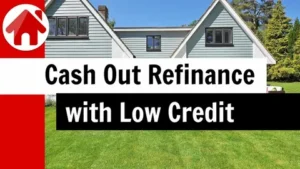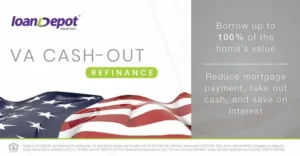A cash-out refinance can be an excellent financial tool when you have equity in your home and need a lump sum of cash. Essentially, it involves refinancing your current mortgage for a higher amount than you owe, with the difference being paid out to you in cash. This cash can be used for various purposes such as home improvements, debt consolidation, or educational expenses.
Key Features of a Cash-Out Refinance:
- How It Works:
- You replace your current mortgage with a new, larger loan.
- The difference between the new loan amount and your existing mortgage balance is paid out in cash.
- For example, if your home is worth $400,000 and you owe $200,000, you can refinance for $250,000, receiving a $50,000 lump sum to use as needed.
- Loan Term and Interest Rate:
- A cash-out refinance resets your mortgage, potentially changing the interest rate and loan term.
- If you originally had 15 years left on your mortgage, you might now have a new 30-year loan.
- Cash-out refinances often have lower interest rates compared to credit cards or personal loans, making them a more affordable option for accessing cash.
- Qualification Requirements:
- Credit Score: Typically, a score of 580 to 620 is required depending on the lender. Conventional lenders may require higher scores.
- Equity in Your Home: Lenders typically require you to maintain at least 20% equity, although some may accept 10% equity.
- Debt-to-Income (DTI) Ratio: Most lenders prefer a DTI ratio of 50% or lower.
- Pros:
- Lower Rates: Cash-out refinances often come with lower rates compared to other loans like personal loans or credit cards.
- No Second Loan: Unlike a home equity loan, a cash-out refinance replaces your current mortgage rather than adding a second loan, simplifying payments.
- Access to Large Sums: You can tap into a significant portion of your home’s equity.
- Cons:
- Risk to Your Home: If you default on the refinance loan, you could lose your home.
- Closing Costs: Expect closing costs between 2% and 6% of the loan amount.
- Loan Term Reset: You may end up with a longer loan term, potentially increasing the total interest paid over time.
- Approval Complexity: The application process can be more complicated than traditional mortgages, with extensive paperwork and documentation.

Best Cash-Out Refinance Lenders
Here are some of the top lenders offering cash-out refinance options, tailored to different needs:
- Rocket Mortgage:
- Best for Digital Refinancing: Offers a seamless online experience, fast pre-approvals, and high customer satisfaction.
- Min. Credit Score: 580-620.
- Pros: Quick application, high customer ratings, fully digital process.
- Cons: No physical branches.
- NBKC Bank:
- Best for FHA Loan Refinancing: Offers FHA refinancing options, including the FHA Streamline Refinance.
- Min. Credit Score: Not specified.
- Pros: Great customer service, offers unique products like FHA loans.
- Cons: Personal information needed to get rate quotes.
- PenFed Credit Union:
- Best for Low APR: Known for its competitive APR rates, with a starting rate of 6.389%.
- Min. Credit Score: Not specified.
- Pros: Low rates, no membership restrictions.
- Cons: Membership required.
- Navy Federal Credit Union:
- Best for VA Loan Refinancing: Offers up to 100% loan-to-value (LTV) ratio for VA loan refinances.
- Min. Credit Score: Not specified.
- Pros: High LTV ratio for veterans, online tools for tracking the loan process.
- Cons: Membership required (only available to military members and their families).
- SoFi:
- Best for Loan Term Options: Offers multiple loan terms, including 10, 15, 20, and 30 years.
- Min. Credit Score: Preferably 620.
- Pros: Flexible loan terms, $500 processing fee discount.
- Cons: Only offers conventional and jumbo loans, not FHA or VA loans.
- Warp Speed Mortgage:
- Best for Fast Closing: Guarantees a 14-business-day closing, with a $2,000 credit if it takes longer.
- Min. Credit Score: Not specified.
- Pros: Fast closing, fully digital process.
- Cons: Closing guarantee doesn’t apply to third-party delays.

Alternatives to Cash-Out Refinancing
While cash-out refinancing is a great option, it’s not the only way to tap into your home equity. Here are two alternatives:
- Home Equity Loan (Second Mortgage):
- A home equity loan provides a lump sum of cash based on your home’s equity but doesn’t replace your existing mortgage. You repay it in fixed installments with a fixed interest rate.
- Pros: Fixed rate, predictable payments.
- Cons: Adds a second monthly payment.
- Home Equity Line of Credit (HELOC):
- A HELOC works like a credit card where you can borrow funds up to a limit, with a revolving balance. It has a draw period (usually 10 years) where you can borrow and make interest-only payments, followed by a repayment period.
- Pros: Flexible borrowing, interest-only payments during the draw period.
- Cons: Variable interest rates, potential for fluctuating payments.
Steps to Get a Cash-Out Refinance
- Assess Your Needs: Determine how much cash you need and what you will use it for.
- Check Your Eligibility: Make sure you meet the lender’s credit score, equity, and DTI requirements.
- Compare Lenders: Research different lenders and compare interest rates, terms, fees, and eligibility criteria.
- Submit Your Application: Provide necessary documentation such as proof of income, existing mortgage details, and the purpose of the refinance.
- Close the Loan: Once approved, close the loan and receive the cash payout.
When is a Cash-Out Refinance a Good Idea?
A cash-out refinance might be ideal if you need a significant sum for things like:
- Home Renovations: Upgrading your home can increase its value.
- Debt Consolidation: Paying off high-interest credit cards or loans.
- Education Expenses: Funding a child’s education or your own further studies.
It can be a smart financial decision if you’re looking for a lower interest rate than other financing options and have enough equity in your home. However, be cautious of over-borrowing, as it could increase your debt and extend your loan term.
Conclusion
A cash-out refinance can provide the flexibility you need, but it’s essential to carefully assess your situation. If you’re planning to access a large sum of money, comparing different lenders, considering the impact on your loan term, and seeking expert advice will help you make the best choice.

